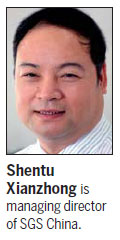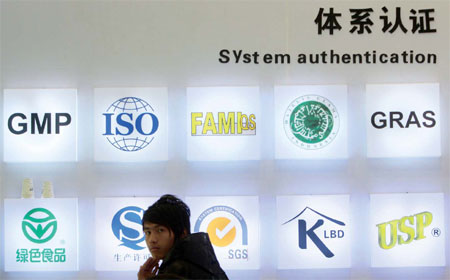Stamp of intent
Updated: 2012-11-16 11:23
By Yan Yiqi (China Daily)
|
|||||||||||
|
A pharmaceutical company demonstrates the quality certificates it has won at a pharmaceuticals exhibition in Nanjing, Jiangsu province. More and more Chinese companies have started to get certificates from international and local agencies to facilitate their business in overseas markets. An Xin / for China Daily |
Foreign certification firms are finding myriad opportunities to help Chinese exporters sell abroad
With less than two months to go, Sun Jianbo, general manager of Zhejiang Jinshan Textiles Co, is on a hectic mission to turn the company around before the New Year's Day. On a recent workday, Sun has his ear glued to the phone trying to call a host of foreign agencies to certify his fabric products. "Customers only recognize certificates authorized by international agencies, so although I got some (certificates) from Chinese certification companies, we still need a foreign one," he says.
 |
From determining if the chemicals used in processing the fabrics are safe to ensuring the entire production process is not harmful to the environment, the requirements to secure foreign certification are moderately high for Zhejiang Jinshan Textiles, but Sun thinks it's the only way he is ever going to turn the business from a domestic producer to a far-reaching exporter. By the end of the day, Sun was working hard to finalize an agreement with a foreign agency.
With a growing number of Chinese companies selling products in Western markets, securing foreign certificates is becoming both popular and necessary for these companies, especially in light of an increasing number of export barriers against Chinese products. Essentially, if these companies want to expand their business abroad, they have to meet another country's standards for consumer safety.
According to a report by the United Nations Conference on Trade and Development, Chinese products worth an average of $7.4 billion (5.8 billion euros) were refunded every year because of technical barriers.
Another reason why Chinese companies, from sectors such as consumer electronics to food, are more interested in procuring foreign certificates is the nation's economic slowdown. Though Chinese exports beat consensus estimates in October, overall growth this year has been sluggish. This is the main reason why Zhejiang Jinshan Textiles is redefining its business model.
But most Chinese certification agencies are not licensed to issue international certificates accepted by European or US markets. According to China's Certification and Accreditation Administration, most European countries and the US require testing results and certificates issued by agencies that they have appointed.
This gap has opened the door to third-party agencies, mostly foreign ones, to play an essential role in China's exporting business, says Liu Weijun, chief engineer of China's Certification and Accreditation Administration.
Liu says China has authorized business licenses to 37 foreign certification agencies and 47 testing agencies to operate in China. According to the CAA, China is now in possession of 174 certification and verification agencies, of which 58 are state-owned and 37 are foreign agencies.
"Certification and verification is like a bridge between China and the rest of the world. With increasingly higher quality demands in Western markets, facilitating certification efforts in China is important," he says.
Shentu Xianzhong, managing director of SGS China, a certification agency based in Switzerland, says that the company sees many opportunities in the Chinese market. "The Chinese market is one of the largest in the world. The global certification and verification market has a market capacity of between 700 billion yuan ($112 billion; 88 billion euros) and 1 trillion yuan," he says.
 |
SGS entered the Chinese market as early as 1991, soon after China started to develop its certification and verification industry, which didn't become vital to the Chinese market until after China became a World Trade Organization member in 2001.
Headquartered in Beijing, SGS China has more than 40 branches, 50 testing laboratories around China and more than 10,000 employees.
Another global certification leader, UK-based BSI, also lays great stress to the Chinese market.
Gao Yimin, managing director of BSI China, says that integration into the global economy is driving Chinese enterprises to meet the standards of European and US markets in order to increase competitiveness.
BSI, which established the Chinese division in 1995, currently employs more than 260 people. It has four offices and has sales or assessor contacts across the country in 19 cities. It plans to expand to more regions over the next few years.
"In recent years, there have been some great developments in the Chinese verification and certification industry. Most enterprises in China have realized the importance of these certificates as part of their daily production and management," Gao says.
| ||||
He says growth in China's certification and accreditation market and the increasing presence of foreign agencies have been effective in overcoming export barriers in other countries.
"With the efforts of both certification agencies and Chinese companies, Chinese products are having a bigger presence in Western markets. Certification and verification help Chinese products to build up a better 'Made in China' image," he says.
Liu says that foreign agencies appear to want more, if not complete, access to certifying domestic business. They don't want to just deal with Chinese exports, but also imports.
Shentu says state-owned certification agencies are still dominant in the niche industry, especially with China Compulsory Certifications that are used to verify the safety of imported goods.
"When people talk about foreign certification agencies, they will naturally link us to the image of dealing only with export business. The fact is, we also hope to deal with more domestic businesses, so that our business in China can reach a balanced status, which I believe won't take a very long time," says Shentu, the SGS China president.
By the end of 2011, China had issued more than 290,000 CCC certificates, according to the CAA.
Shentu says the advantage of foreign agencies lies in their global network and advanced operation and marketing experience.
"Take SGS as an example. It has a history of more than 130 years. Our long-term experience and strong global business network enables us to react rapidly to changing standards in target markets, and work out suitable solutions for our clients," he says.
BSI positions itself by providing Chinese clients with one-stop solutions, ranging from standards shaping to quality management systems training.
"All of these offerings benefit from BSI's experience as the originator of more than 30,000 different standards. Currently, eight out of the 10 most widely used international standards were originated by BSI," Gao claims.
He says BSI's advantage is that it develops standards and provides certification of these standards in the market.
One of the major problems in the Chinese market is that many Chinese companies lack the awareness of certification and verification.
"Some enterprises still have no clear awareness of standards. In addition, implementation does not always achieve 'best practice' levels, which creates a considerable gap between Chinese enterprises and those in Europe and the US," Gao says.
Sun from Zhejiang Jinshan Textiles admits that it was not until this year that his company started to realize the importance of certification.
"We used to believe that as long as our products are of good quality, there will be no worry in attracting foreign clients. However, with stricter importing rules set up by our target markets, our products cannot even enter the market without a certificate," he says.
Sun says most of the textile companies he knows do not think securing certification is important.
"To tell the truth, most of us do not fully know such third-party tests," he says.
Shentu points out that even though some companies are aware they should get certification for their products, they lack proper quality management of their supply chain.
"Quality control is not the matter of only one company, but also of companies on the supply chain. Most Chinese companies fail to notice this," he says.
Cathy Yan, vice-president of TUV Rheinland Co Greater China region, another foreign certification agency, echoes Shentu's sentiment.
"Compared with Japanese and Korean companies, Chinese companies are not paying enough attention to third-party tests and certification. They do audits more or less from the government's or the industry's requirements," she says.
Yan says although national awareness of certification is not on the same level as in developed countries, she is confident about the future.
"Companies' environmental consciousness is related to the country's industrialization level. The government is doing a great job by introducing policies. I believe Chinese companies will catch up with their Japanese and Korean counterparts after some time, especially when consumers demand green and safe products," she says, adding market demand will push companies to adopt higher standards.
Liu says the CAA, together with international certification organizations, is making efforts to educate Chinese companies about the importance of certification and third-party testing.
"To overcome trade barriers, the only way out is to provide products with higher quality and meet the standards set by the target markets," he says.
Wang Chao contributed to this story.
yanyiqi@chinadaily.com.cn
(China Daily 11/16/2012 page12)
Today's Top News
Rescuers race against time for quake victims
Telecom workers restore links
Coal mine blast kills 18 in Jilin
Intl scholarship puts China on the map
More bird flu patients discharged
Gold loses sheen, but still a safe bet
US 'turns blind eye to human rights'
Telecom workers restore links
Hot Topics
Lunar probe , China growth forecasts, Emission rules get tougher, China seen through 'colored lens', International board,
Editor's Picks

|

|

|

|

|

|








